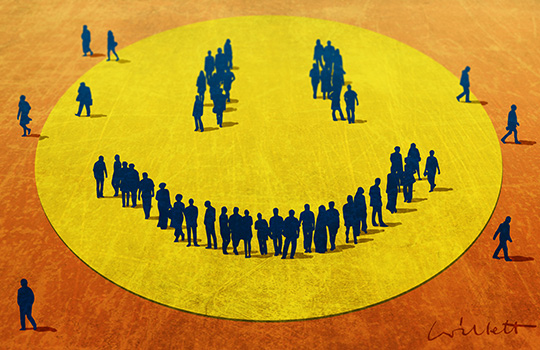Matt Morgan and Peter Brindley have been studying human doctors in their native conference environment
While there is always a medical conference on the horizon, this fallow time of year allows for respite and reflection. We can put our tiny tube of toothpaste away, we can forego removing our shoes for airport security and we can focus on the important stuff: which colourful lanyard to wear for the remainder of the year. While you were, no doubt, studiously absorbing the latest advances in your field, we took a different, albeit distracted, approach. We were the two folks sitting in the back, studying the human doctor in his/her native conference environment. Think of us like Desmond Morris or David Attenborough but without their charm, erudition, or intelligence. We wish to summarize our findings, and in a format relevant to the modern learner: which conference emoji are you?
The human sponge
You arrive early, get the best seat, and sharpen your metaphorical pencil. Before you know it, you have filled a whole notepad with at least 200 essential take home messages. You have a carefully constructed schedule, timed to perfection to catch the best sessions: often you colour code. You race from session to session, you soak up knowledge, and file it neatly: you are a conference hero! You return home eager to share it on your next ward round. Nobody listens.
The social butterfly
For you, the value of a conference lies not in its content but its people and its receptions. You meet old friends and make new ones, you don’t miss a single social event and you spend the bright conference days rehydrating from the night before. Your clothing reflects your personality: loud, lively, and designed to attract attention. You hug dear friends farewell and make all kinds of plans to catch up. None of these follow-up meetings occurs until next year’s conference. You wish to call in sick for your next shift, as you are rather too exhausted for clinical work.
The ultra-tweeter
The first question from your lips is “how fast is the wifi?”, followed breathlessly by “and the hashtag?”. You tirelessly tweet every moment—poignant or mundane, you don’t care. You spend more time with your screen than any flesh or blood human. You have hundreds of “conference friends” but wouldn’t recognize any of them in three dimensions. You return home, holding your head high as the most trending tweeter. No one can take that away from you. Surprisingly, you receive little public adulation.
The niche celeb
Nobody knows more than you about less. You are the don of the anterior mitral valve leaflet. People flock and queue to hear your latest musings: as long as one person constitutes a queue? You laugh loudly at your own jokes, and you are the smartest person you have ever met. For that brief conference moment, you feel like Justin Bieber: just with fewer tattoos, and without the Lamborghini. During the conference you get to taste the high life by guzzling free soft drinks in the speaker’s area. You spend most of the conference trying to get invited back. Before you know it, you are back on the 14h15 train to Slough: ready to take out the bins and to clean up after the dog.
The hopeless wanderer
You never seem to be in the right place at the right time. You wander from one empty lecture hall to the next. Why do you always miss that keynote that everyone is talking about? You walk down a long corridor to use the toilet, only to face a locked fire exit. You are tired of getting stuck in stairwells. When you arrive for lunch, there is one remaining sandwich, or more accurately a piece of wrinkled bread stuck to a sweaty lettuce leaf. You swear you’re done with conferences. We will see you next year.
The irrelevant question asker
At the microphone during question time, you recount your own interpretation of the speaker’s talk. But first, a six-part comment that starts with an irrelevant anecdote from 20 years ago. The audience needs to understand that you are “a frontline doc” and not one of these “ivory tower eggheads” and not a “pinhead administrator”. When asked what your question is, you sheepishly admit that you don’t have one. In fact, it’s just a statement really, and was fully addressed in the opening slide. People fidget in their seats and eye the clock. Next question please.
The vacationer
You’ve always fancied visiting this city and have unused conference leave. You might even submit a poster, but won’t be standing by it at the appointed hour. Instead of attending the sessions, you realize that there are bikes to be rented, slopes to be skied, and museums in which to loiter. How do we know you had a better time than us? Don’t worry you will tell us.
The naysayer
It’s all rubbish, it’s all been said before, and none of this is relevant to practice. You harrumph your way through three days. You do your best to catch people’s eyes with your world-weary expressions. You seem personally offended that the p-value was greater than 0.05 and you can’t believe the taxpayer is supporting this bush-league research. Surprisingly, you are invited to present the following year. You have a change of heart: what a terrific conference.
Matt Morgan, Honorary Senior Research Fellow at Cardiff University, Consultant in Intensive Care Medicine and Head of Research and Development at University Hospital of Wales, and an editor of BMJ OnExamination. He is on twitter: @Matrix_Mania
Peter Brindley, Professor in the Department of Critical Care Medicine, Department of Anesthesiology and Pain Medicine, and the Dosseter Ethics Centre, University of Alberta, Edmonton, Canada. He is on twitter: @docpgb
